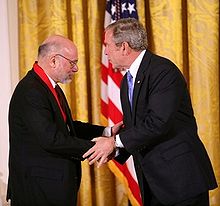The National Humanities Medal is an American award that annually recognizes several individuals, groups, or institutions for work that has "deepened the nation's understanding of the humanities, broadened our citizens' engagement with the humanities, or helped preserve and expand Americans' access to important resources in the humanities."
| National Humanities Medal | |
|---|---|
 | |
| Awarded for | Exceptional Contributions in the Humanities |
| Location | Washington, D.C. |
| Country | United States |
| Presented by | President of the United States |
| First awarded | 1997 |
| Website | https://www.neh.gov/taxonomy/term/246 |
Ribbon of the medal | |

The annual Charles Frankel Prize in the Humanities was established in 1988 and succeeded by the National Humanities Medal in 1997. The token is a bronze medal designed by a 1995 Frankel Prize winner, David Macaulay.
Medals are conferred annually, usually by the U.S. President, to as many as twelve living candidates and existing organizations nominated early in the calendar year. The president selects the winners in consultation with the National Endowment for the Humanities (NEH). NEH asks that nominators consult the list of previous winners and consider the National Medal of Arts to recognize contributions in "the creative or performing arts".
Recipients
Medalists are listed by year, then alphabetically by surname.
The Charles Frankel Prize
- 1989
- Patricia L. Bates
- Daniel Boorstin
- Willard L. Boyd
- Clay Jenkinson
- Américo Paredes
- 1990
- Mortimer Adler
- Henry Hampton
- Bernard Knox
- David Van Tassel
- Ethyle R. Wolfe
- 1991
- 1992
- Allan Bloom
- Shelby Foote
- Richard Rodriguez
- Harold K. Skramstad, Jr.
- Eudora Welty
- 1993
- 1994
- Ernest L. Boyer
- William Kittredge
- Peggy Whitman Prenshaw
- Sharon Percy Rockefeller
- Dorothy Porter Wesley
- 1995
- 1996
- Rita Dove
- Doris Kearns Goodwin
- Daniel Kemmis
- Arturo Madrid
- Bill Moyers
The National Humanities Medal
- 1997
- Nina M. Archabal
- David A. Berry
- Richard J. Franke
- William Friday
- Don Henley
- Maxine Hong Kingston
- Luis Leal
- Martin Marty
- Paul Mellon
- 1998
- 1999
- 2000
- 2001
- 2002
- 2003
- 2004
- 2005
- 2006
- 2007
- 2008
- 2009
- 2010
- 2011
- 2012
- 2013
- 2014
- The Clemente Course in the Humanities
- Annie Dillard
- Everett L. Fly
- Evelyn Brooks Higginbotham
- Jhumpa Lahiri
- Fedwa Malti-Douglas
- Larry McMurtry
- Rebecca Newberger Goldstein
- Vicki L. Ruiz
- Alice Waters
- 2015
- 2016
- None awarded
- 2017
- None awarded
- 2018
- None awarded
- 2019
- 2020
- 2021